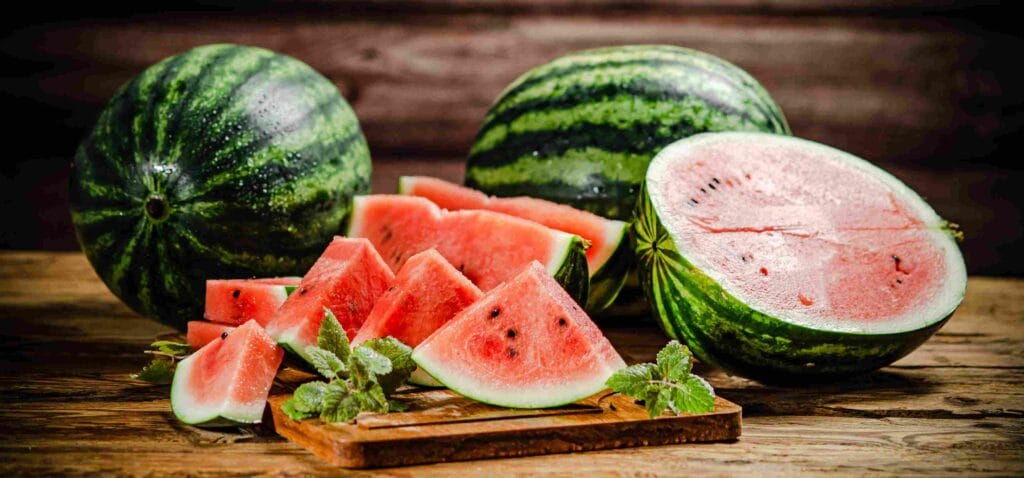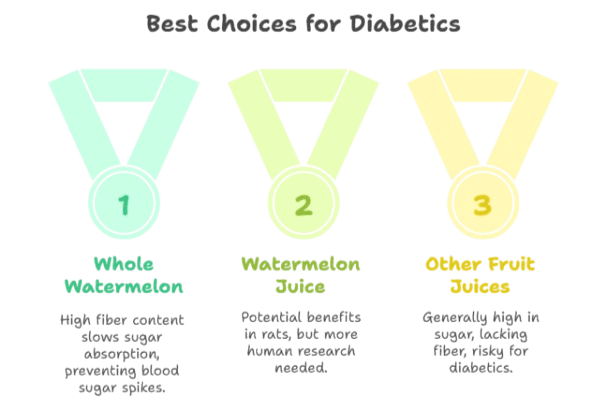
Table of Contents
Introduction: The Sweet Myth – Why You’ve Been Misled About Watermelon and Diabetes
Is watermelon bad for diabetics? The simple answer might surprise you—no, watermelon does not directly cause harm to diabetics. But the luscious, sweet fruit has something of a bad rap among folks who are watching their blood sugar levels, and that can leave people feeling fearful and confused. The Natural Sweetness Ruling Many diabetics have been told to avoid watermelon due to its natural sugar content, but is this advice really necessary?
It’s no wonder people with diabetes steer clear of watermelon — its sweetness can be a red flag. But what if we told you that watermelon is actually something that can fit into a diet that’s friendly for diabetics without doing damage to your health?
A common myth is that diabetics should avoid sweet fruits such as watermelon on the basis that they will cause high blood sugar levels. But not always. Watermelon is fairly low on the glycemic index and may be eaten in moderation.
Pretend you were ‘allowed” to just ravish a cold slice of water melon on a hot summer day without thinking about your blood sugar! You don’t have to forgo your favorite fruits! We are going to research some shocking truths about watermelon and diabetes in this article, revealing how you can eat this delicious fruit without fear.
Read on to learn more about the unexpected perks and easy techniques to incorporate watermelon into your diabetes-friendly eating plan. Read on to bust the myths and know how to relish this hydrating fruit with confidence!
Shocking Truth #1: The Glycemic Index (GI) vs. Glycemic Load (GL) Deception – Watermelon is Not the Sugar Bomb You Thought it Was
The Myth: Watermelon Has A High Glycemic Index
Watermelon is often maligned as being high in sugar (including sugar’s natural friend, I). /^\(281\)$/ The Glycemic Index (GI) for watermelon ranges from 72 to 80, which is high. The GI is a measure of how quickly a food makes blood sugar levels rise after eating. High-GI foods such as watermelon are commonly referred to as “sugar bombs,” which has raised concerns for individuals with diabetes. That may be why so many of us think that watermelon should be avoided at all costs.
However, this view of things, overlooks one very important nutrient factor that can turn everything around…Glycemic Load (GL).
The Secret of the Glycemic Load (GL)
GI is helpful, but it doesn’t completely address the issue. GL – Glycemic Load is a better way of assessing a foods impact on blood sugar. It considers both the GI of a food and the portion size you normally eat. Here’s how you figure it out: Take the GI of a food (you can look it up online), multiply by its carbohydrate content per serving, then divide by 100. This provides a more accurate reflection of how food can affect blood sugar in everyday life.
The Sweet Secret of the Low Glycemic Load of Watermelon
Now it gets interesting. Watermelon has a high GI, but its GL is relatively low because it has a high water content (91-92%). For instance, 1 cup (154 grams) of watermelon has a GL of around 5–8. This means that the overall effect of watermelon on blood sugar is much less than you might assume.
A study from the American Journal of Clinical Nutrition reported that low Glycemic Load foods are more modest when it comes to raising blood sugar levels, thus, fine for diabetics to enjoy in moderation (Slavin, 2013).
Practical Application: Attention on GL, Not Only GI
Key, for diabetics, is Glycemic Load and not just the Glycemic Index. A high-GI food such as watermelon can still be incorporated into a healthy diet, provided it is consumed in moderation. While eaten in moderation, watermelon can serve as a refreshing, hydrated and low-impact fruit when it comes to blood sugar levels.
Takeaway:
You don’t want to be using GI in isolation and not understand GL and portion size. Watermelon, when eaten mindfully, is not the sugar bomb we sometimes think it is!
Stunning Truth #2: Behind the Red Flesh – Secret Powers of Watermelon Rind and Seeds
The Overlooked Parts: What You’re Throwing Away
When you think of watermelon, you probably think of the sweet, juicy red flesh. But few people are aware of the amazing health benefits the rind and seeds hold, they just throw them away. These commonly trashed parts of the watermelon are actually pretty good for you.
Watermelon Seeds: A Nutritional Powerhouse
Watermelon seeds are so much more than something to spit at a picnic. These small seeds are a rich source of the healthy fats, fibre and protein that can slow sugar absorption, making them a welcome addition to a diabetes-friendly diet. In fact, they’re a great source of:
- Healthy Fats: Good for your heart.
- Protein: Used to build and repair tissues.
- Fiber: Aids digestion and keeps your blood sugar levels in check.
- Minerals: Contain magnesium, iron and zinc that are essential for general health.
According to a study published by the Journal of Food Science and Technology, eating watermelon seeds have health benefits contrary to the widely held views that it is unhealthy (Ali et al., 2016).
Watermelon Rind: The End of Citrulline Parade
Now let’s discuss the rind. Though small and inedible, the white flesh that’s closest to the rind contains the greatest amount L-Citrulline, an amino acid found to have positive effects on blood flow. Citrulline may actually help improve the health of your blood vessels, increasing nitric oxide production, which is good for improving circulation, helping lower blood pressure.
Gonzalez, et al, (2017) from University of Kentucky revealed that L-Citrulline can contribute to your heart health and it can even work on enhancing your exercising performance. So don’t toss the rind next time — use it!
Creative Culinary Uses
So instead of throwing it away, maybe you should try these creative uses for the juiced rind:
- Pickled Watermelon Rinds: Slice the rind and soak it in vinegar and sugar for a crunchy, tangy treat.
- In Smoothies: Pour rind into the blender with some ice and fruit for a delicious way to help you recover.
- Watermelon Rind Juice: The rind can be juiced into a hydrating, nutrient-rich beverage.
Takeaway:
The next time you eat watermelon, consider the fruit beyond its red flesh. Watermelon seeds and rind are nutritious parts of the fruit that can offer several health benefits, including better blood sugar control, improved heart health, and a higher intake of several vitamins and minerals. Don’t let them go to waste!
Shocking Truth #3: The Juicing Paradox – How Watermelon Juice can battle diabetes (with a catch!)
The General Rule: Why Diabetics Are Warned Against Fruit Juice
It is well known that diabetics should steer clear of fruit juices in most cases. Why? What about fruit juice?Because fruit juice is typically high in added sugars and doesn’t contain the fibre that is naturally occurring in a whole piece of fruit. Because juice has no fiber, the sugar is absorbed quickly as it courses through the bloodstream, potentially leading to dangerous spikes in blood sugar. This can be a problem, which is why most health experts suggest choosing whole fruits over juices, and they are generally correct.
The Scientific Twist: Watermelon Juice and A Shocking Connection to Diabetes
However, a surprising study has revealed a twist in the tale. There was, however, a scientific experiment published by the National Library of Medicine (PMC) conducted on alloxan-induced diabetic rats which indicated that watermelon juice did actually cause a significant difference in blood glucose. Findings of the research: The research revealed that watermelon juice:
- Lowering of blood glucose in rats that are diabetic.
- Weight loss due to diabetes reversible.
- Increased beneficial antioxidant enzymes in the body.
- Lower oxidative stress: This is typically high in people with diabetes.
These results indicate that watermelon juice is rich in bioactive compounds that might be effective in the treatment of diabetes. The antioxidants — and possibly the other good stuff — in the juice seem to help mitigate against this, and that’s all we’ve got to go on for cures at this time.
Human Caveats: Drink Juice? Not So Fast
As interesting as the study’s findings are, it’s important to treat them with caution. The study was done in rats, not people, and more research is needed before anyone can draw firm conclusions. Regardless of the good results, whole watermelon still remains a better choice for diabetics. Whole fruit is high in fiber, which can help slow the absorption of sugar into the blood stream, which may prevent big spikes in blood glucose.
Takeaway:
The “shocking truth” here is the possibility that watermelon juice may have power, but it’s not a license for diabetics to go around drinking juice. Whole watermelon is still the way to go because of the fiber, and more research is required before we can recommend juicing as a standard part of a diabetic diet. As always, see a healthcare provider before making drastic changes in your diet.
Shocking Truth #4: Your Body’s Secret Weapon – How Watermelon’s Bioactive Compounds Are Fighting Diabetes For You
Beyond Basic Nutrition: The Hidden Power of Bioactive Compounds
Watermelon, popular for its vitamin C content and hydration value, has so much more to offer it seems, thanks to its bioactive compounds. These potent compounds, which have been largely ignored, could exert a major positive effect on diabetes and its associated conditions. It’s not just about the basic nutrition; it’s the underappreciated compounds that lie beneath the surface.
L-Citrulline’s Role – A Non-Drug Weapon Against Insulin Resistance
One of watermelon’s most powerful bioactive compounds is L-Citrulline, abundant in the rind of the fruit. L-Citrulline, an amino acid, enables the flow of blood and nutrients to the muscles and the removal of the lactic acid. Your body changes L-Citrulline into Nitric Oxide. Nitric oxide is crucial for good vascular health by dilating blood vessels to optimise the flow of blood. This is especially good news for diabetics who are at an increased risk for high blood pressure and heart disease. Research has demonstrated that nitric oxide can help lower insulin resistance, an important issue when it comes to controlling blood sugar levels.
The American Journal of Physiology published a study that reports supplementing with L-Citrulline enhanced blood vessel function in those with metabolic syndrome and decreased insulin resistance (Figueroa et al., 2010).
Armored with Lycopene: Heart Protection for The Diabetics
The deep red hue of watermelon is because of Lycopene, which is a potent antioxidant that also has anti-inflammatory effects. One of the most widely recognized benefits of consuming lycopene is its ability to help prevent cardiovascular disease, which is also an ongoing issue for many that have diabetes. Fresh watermelon is actually a better source of lycopene than tomatoes, and that’s hard for a lot of people to think about, but there it is.
According to studies in the Journal of Nutritional Biochemistry, lycopene may diminish oxidative stress and inflammation within your body, both of which increase the risk of cardiovascular problems for diabetics (Rao et al., 2007).
Other Antioxidants: A Full Spectrum of Protection.
Apart from L-Citrulline and Lycopene, watermelon also has other important antioxidants such as Vitamin C and Beta-carotene. These antioxidants combine to help reduce inflammation and promote cell health and, in turn, bolster the body’s ability to mitigate the destructive impact diabetes can have. In particular, it has been demonstrated that Vitamin C contributes to enhanced immune function and offers protection from free radical damage.
Takeaway:
Watermelon is not just a hydrating fruit — it’s a secret weapon against diabetes. Its bioactive nutrients, such as L-Citrulline and Lycopene, provide tremendous advantages that go beyond simple nutrition. By including watermelon as part of a balanced diet, we can promote heart health, improve insulin resistance, and combat inflammation, all important aspects for diabetes management. So, the next time you have a slice of watermelon, remember: it’s not just a delicious indulgence; it’ll help you feel better in the moment.
Shocking identity #5: The “Digestive Dilemma” – Watermelon’s Secret Side Effect for a Few Sensitive People
Watermelon is commonly referred to as a hydrating, thirst-quenching fruit, especially during the summertime. It’s packed with vitamins, minerals and antioxidants making it a healthy option for many. But here’s the thing: some people may actually experience gastrointestinal distress after eating watermelon — it’s just that no one ever talks about that. Yes, you heard that correctly – this harmless fruit can create an unexpected digestion predicament in some individuals. And let’s try to figure out why this is.
The Unseen Challenge
Watermelon, despite being a rich source of water and other healthful ingredients, harbours a little known effect: its high fructose content. For most, eating watermelon is a refreshing way to get rid of bloat, but for some people, it has the opposite effect. This can be especially problematic for those with a sensitive stomach, so watermelon isn’t really the best choice for all.
FODMAPs Explained
So what is it about watermelon that gets the digestive juices flowing? The reason all comes down to its fructose content. Watermelon is known to be a high-FODMAP food. FODMAPs are short-chain carbohydrates (sugars) that are not properly absorbed in the small intestine. They include:
- Fermentable Oligosaccharides
- Disaccharides
- Monosaccharides (e.g. fructose)
- Polyols
Some people have trouble properly absorbing fructose, a sugar that occurs naturally in fruits. Filling the large intestine, it ferments and creates gas, bloating and other digestive symptoms.
Who is Affected?
If you have certain digestive disorders, like fructose malabsorption or Irritable Bowel Syndrome (IBS), you are more likely to suffer from these offensive symptoms after eating watermelon. Symptoms can be different for everyone, but typically are:
- Bloating
- Excess gas
- Stomach cramps
- Diarrhea or constipation
This is because these people are not good at digesting fructose, which ferments in the gut.
Actionable Advice
If you have a sensitive stomach or suspect you might suffer from fructose malabsorption or IBS, here’s what you can do:
- Track your intake: If you suspect that watermelon might be giving you digestive trouble, try monitoring your consumption and your body’s reactions.
- Control your intake: You may need to control how much watermelon you consume (or avoid it altogether) when you’re experiencing an IBS flare.
- Get guidance from a dietitian: They can help you work out how much you can tolerate, and advise on better ways of including fruit into your diet.
Takeaway:
Ultimately, watermelon is very good for you and hydrating, but it’s something you should be aware of if you have a sensitive body. If you are someone who’s more sensitive to GI upset, you might want to limit watermelon or seek professional advice, if you want to prevent potentially fun few hours on the toilet.

Shocking Fact #6: It’s All in the Timing – How to Maximize Your Watermelon Pleasure and Maintain Stable Blood Sugar.
Watermelon is no doubt a delicious and refreshing fruit, but did you know consuming it can raise your blood sugar levels? It’s not simply a question of moderation; the timing of your watermelon feast can have an impact on the way your body processes its natural sugars. Here’s how to best enjoy watermelon and keep your blood sugar in line.
Beyond Just “Moderation”
Though moderation is important, when you eat your watermelon makes a big difference in how your body reacts to it. Watermelon timing can be quite important, as it could be just what you need to keep your blood sugar from spiking, or, if you have it at the wrong time, your energy and mood from lagging, according to Alanna Moshfegh, a registered dietitian nutritionist.
Pre/Post-Workout Power-Up
One of the perfect times to enjoy watermelon is for your workout. Exercise helps sugar get processed more efficiently in your body, so your muscles cells can use that natural sugar from watermelon. This makes it a great snack before or after exercise to prevent too fast of a rise in your blood sugar levels.
Strategic Partnering for Stability
Combining watermelon with protein or good quality fats is another great way to help stabilize blood sugar. For example, throwing in a handful of nuts, a spoonful of plain yogurt, a slice of avocado or some cheese can decrease how quickly sugar enters your bloodstream, preventing large spikes in your blood sugar. The two together also keep you full, so that you won’t want to eat for a while.
Balanced Meal Integration
Try to eat watermelon as a part of a balanced meal and avoid consuming it in excess, especially on an empty stomach. Combining it with other food groups can balance out the sugar load.
Avoid Late-Night Consumption (Generally)
Do note that watermelon is healthier than the majority of processed snacks, but it may not be the ideal choice for a late-night snack. The natural sugars in watermelon may impact your resting blood sugar levels and could interfere with your sleep. If you want something sweet at night, watermelon is better for you than sugar-sweetened food, and it’s low in calories, Langer said.
Shocking Truth #7: The Customized Truth – Your CGM is the End Game
Generic advice often leaves something to be desired when it comes to blood sugar control. You’ve probably heard of glycemic index (GI) or glycemic load (GL) charts, but did you know that they give only a general picture of how food affects blood glucose levels? The bottom line is that everyone has a different body and reacts to food differently, so what works for one person might not work for someone else. And this is where a CGM (Continuous Glucose Monitor) changes the game.
Beyond Generic Advice
Although GI/GL charts can be a useful starting point, they don’t take into consideration your individual metabolism. Personal factors — including insulin sensitivity, your gut microbiome and even how stressed you are — can drastically affect how your blood sugar responds to foods like watermelon. The result? One-size-fits-all guidance may not provide a complete picture for your blood sugar control.
The Power of CGM
A Continuous Glucose Monitor (CGM) can show you how your body reacts to food in real time. Wear a tiny sensor and you can monitor spikes, or cages, in your blood sugar all day long, even after eating watermelon. It doesn’t get much better than this in terms of seeing how your body is reacting to what you place in it, providing a type of information that traditional methods just can’t offer.
Empowering Self-Management
You can discover customized blood sugar patterns with a CGM. For example, you can eat a small piece of watermelon and it won’t have much effect, but when you eat more of it, your b.g. goes up. Armed with these numbers, you can make super-specific changes to your eating routine — like modifying portion size, serving up watermelon with protein, or timing when you eat — to keep blood sugar balanced.
From Flying Blind to Informed Decision-making
The great thing about the CGM is that you can move from general advice to actual real-time data. By digging in past general recommendations, you can get your diet and lifestyle customized to what your body actually responds to. Because it’s customized, it allows you to be more in charge of treating your diabetes, not only giving you a more effective way to feel better to doing it your way.
Surprising Truth #8: It’s not all about the sugar – The Broader Benefits of Watermelon for Diabetics.
When it comes to controlling diabetes, the emphasis is usually on blood sugar. But watermelon is so much more than just a delicious sweet treat with natural sugars— and surprising healthful benefits that go beyond sugar content make it a diabetic-friendly food that you’ll love!
Hydration Hero
Water Content and Hydration: Watermelon is composed of 90-92% water, and is a wonderful hydrating food. Good hydration is very important in controlling blood pressure, a major part of diabetes care. Being well-hydrated helps your kidneys filter the excess glucose from your blood and promotes good circulation throughout your body. Because it is so high in water content, watermelon can help prevent you from getting dehydrated while it helps your body do what it needs to do.
Weight Management Ally
Watermelon is a low-calorie, high-water food, which can aid in weight management, a significant component of controlling blood sugar. It’s low in calories but satisfying, so it’s a good snack option for people who are trying to maintain or lose weight. Eating low-calorie density foods is filling and prevents over-eating–it contributes to healthier body weight, which is an essential part of managing your insulin sensitivity and blood sugar.
Vitamin and Mineral Richness
Outside of hydration and maintaining a healthy weight, watermelon is filled with vital nutrients that help to promote good health:
- Vitamin A: Healthy eyes and immune system.
- Vitamin C: Good for the immune system and skin.
- Vitamin B6: Contributes to brain function and red blood cell formation.
- Potassium: Aids in maintaining blood pressure and fluid balance in the body.
- Magnesium, Iron, Calcium, and Copper: All these minerals help the muscles, bone, and energy metabolism.
Not only does adding watermelon to your diet keep you hydrated and help with weight management; it also provides nutrients essential for supporting immune function, heart health and promoting health in general.
Takeaway:
Watermelon is more than just a sweet treat for diabetics – it is a delicious hydrating, nutrient-dense fruit that provides numerous benefits unrelated to its sugar content and is a sustainable option as part of a healthful diet.
Keep your blood sugar in check with Gluco Shield Pro! This supplement has been getting rave reviews for helping people feel their best. Ready to feel better every day? Click to learn more!

Conclusion: Embrace the Sweetness – Your Path to Confident Watermelon Enjoyment
In other words, watermelon can still fit into an overall healthy, well-balanced diabetes diet for most people with diabetes—as long as it is eaten in moderation. As we’ve talked about, you can enjoy this refreshing fruit without having to be concerned about blood sugar surges simply by using smart strategies like eating to timing, combining with other nutrients, and knowing the individual glucose response.
Empowerment: Take Control with Smart Strategies
By utilizing the “shocking truths” we’ve delved into, you have been equipped with the power to consume watermelon without fear. And of course, keep in mind that learning about its glycemic impact, consuming it around workouts, combining it with proteins or fats and even employing a Continuous Glucose Monitor (CGM) to monitor your body’s personal response can all help. Even more important, these tactics help you let go, and choose what’s right for your body, and eat your watermelon without ruining your blood sugar.
Expert Advice: Customized Help for You to Succeed
Although this article contains great information, you may want to also consider speaking with a registered dietitian or certified diabetes educator for more specific advice and meal planning based on your individual needs. These experts can guide you in shaping your diet and in making sure your blood sugar management plan is safe and effective. They are going to help you develop a plan that factors in your unique needs and wants.
Final Thoughts: A Road to Fun and Health
If you have diabetes, managing it doesn’t mean that you need to skip out of all the foods you enjoy. You simply need the right knowledge, strategies, and professional guidance to love and eat good (or rather, deliciously nutritious) food to feel amazing. So cut it out already—enjoy the sweetness of watermelon as part of your healthy, diabetes friendly way of life!
In your endeavor to manage blood sugar efficiently, be sure to take a look at Gluco Shield Pro — a dietary supplement formulated to promote normal glucose levels the natural way. Loaded with active ingredients, it complements your healthy diet and exercise regimen. If you need some added help managing your diabetes, then Gluco Shield Pro could be exactly what you need. Curious to learn more? Find out how this supplement can make you feel more assured on your health journey, click: Gluco Shield Pro









The website design looks great—clean, user-friendly, and visually appealing! It definitely has the potential to attract more visitors. Maybe adding even more engaging content (like interactive posts, videos, or expert insights) could take it to the next level. Keep up the good work!
Thank you so much for your support and suggestions. It is really needed for the future improvement of this website.
The website design looks great—clean, user-friendly, and visually appealing! It definitely has the potential to attract more visitors. Maybe adding even more engaging content (like interactive posts, videos, or expert insights) could take it to the next level. Keep up the good work! Whith regards, EURST
The website design looks great—clean, user-friendly, and visually appealing! It definitely has the potential to attract more visitors. Maybe adding even more engaging content (like interactive posts, videos, or expert insights) could take it to the next level. Keep up the good work! Whith regards, GAMER